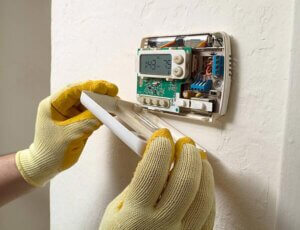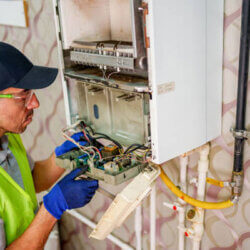
A properly functioning thermostat is crucial for maintaining comfort in your home or business. However, if your air conditioner is not running as expected, a malfunctioning thermostat could be the culprit. With the rise of smart thermostats, compatibility issues and technical glitches can sometimes cause cooling problems. In this guide, we explore common thermostat issues, how they affect AC performance, and when to seek professional AC thermostat repair in St. Louis.
If you’re experiencing cooling issues, contact Galmiche & Sons today. Whether you need air conditioner repair or thermostat repair services, or professionals can diagnose the problem and provide prompt repair service!
Common Thermostat Issues That Impact AC Performance
Your thermostat acts as the brain of your HVAC system, regulating when and how your air conditioner operates. If there is an issue with the thermostat, your AC may not function properly, leading to discomfort and higher energy bills. Some common thermostat issues include:
1. Incorrect Thermostat Settings
One of the simplest reasons an AC unit may not function properly is incorrect settings. Many homeowners accidentally set their thermostats to "heat" instead of "cool" or have the fan running continuously instead of on "auto."
Solution: Double-check your thermostat settings to ensure they are correct. Set the thermostat to "cool" and adjust the temperature to see if the system responds.
2. Dead Batteries or Power Issues
This is another easy thermostat repair solution. If your thermostat screen is blank or unresponsive, dead batteries or power issues may be the cause. Some thermostats are hardwired, while others rely on battery power.
Solution: Replace the batteries if necessary or check your home’s circuit breaker to ensure the thermostat is receiving power.
3. Smart Thermostat Compatibility Problems
Smart thermostats offer advanced features like remote control, scheduling, and energy-saving settings. However, they must be compatible with your HVAC system. Some older AC units may not work properly with newer smart thermostats.
Solution: Consult an HVAC professional to ensure your smart thermostat is properly installed and compatible with your AC system.
4. Dirty or Misaligned Temperature Sensors
A thermostat measures room temperature using built-in sensors. If these sensors are dirty or misaligned, your thermostat may not accurately gauge the indoor temperature, leading to inefficient cooling cycles.
Solution: Gently clean the thermostat and ensure it is positioned away from direct sunlight, appliances, or vents that could affect temperature readings.
5. Wiring Issues or Loose Connections
Loose or damaged wiring can prevent your thermostat from communicating properly with your air conditioning system. Over time, connections can loosen due to age, wear, or improper installation, requiring AC thermostat repair service.
Solution: A professional HVAC technician can inspect and repair faulty thermostat wiring to restore functionality.

How Thermostat Issues Affect AC Efficiency
When a thermostat fails, it can cause several cooling issues, including:
- AC not turning on – If the thermostat is not sending signals to the system, the AC won’t start.
- Air conditioner short cycling – A faulty thermostat may cause the AC to turn on and off frequently, increasing wear and tear.
- Uneven cooling – Incorrect temperature readings can cause inconsistent cooling across your home or business.
- Higher energy bills – An improperly functioning thermostat can lead to inefficient energy use, increasing cooling costs.
FAQs About AC Thermostat Repair
How do I know if my thermostat is bad?
Can I replace my thermostat myself?
What is the lifespan of a thermostat?
Contact Galmiche & Sons for Expert AC Thermostat Repair in St. Louis
If you suspect your thermostat is causing cooling problems, don’t wait for the issue to get worse. At Galmiche & Sons, we offer expert AC thermostat repair services to keep your home or business comfortable. Contact us today to schedule HVAC maintenance service and restore your air conditioner’s efficiency!









